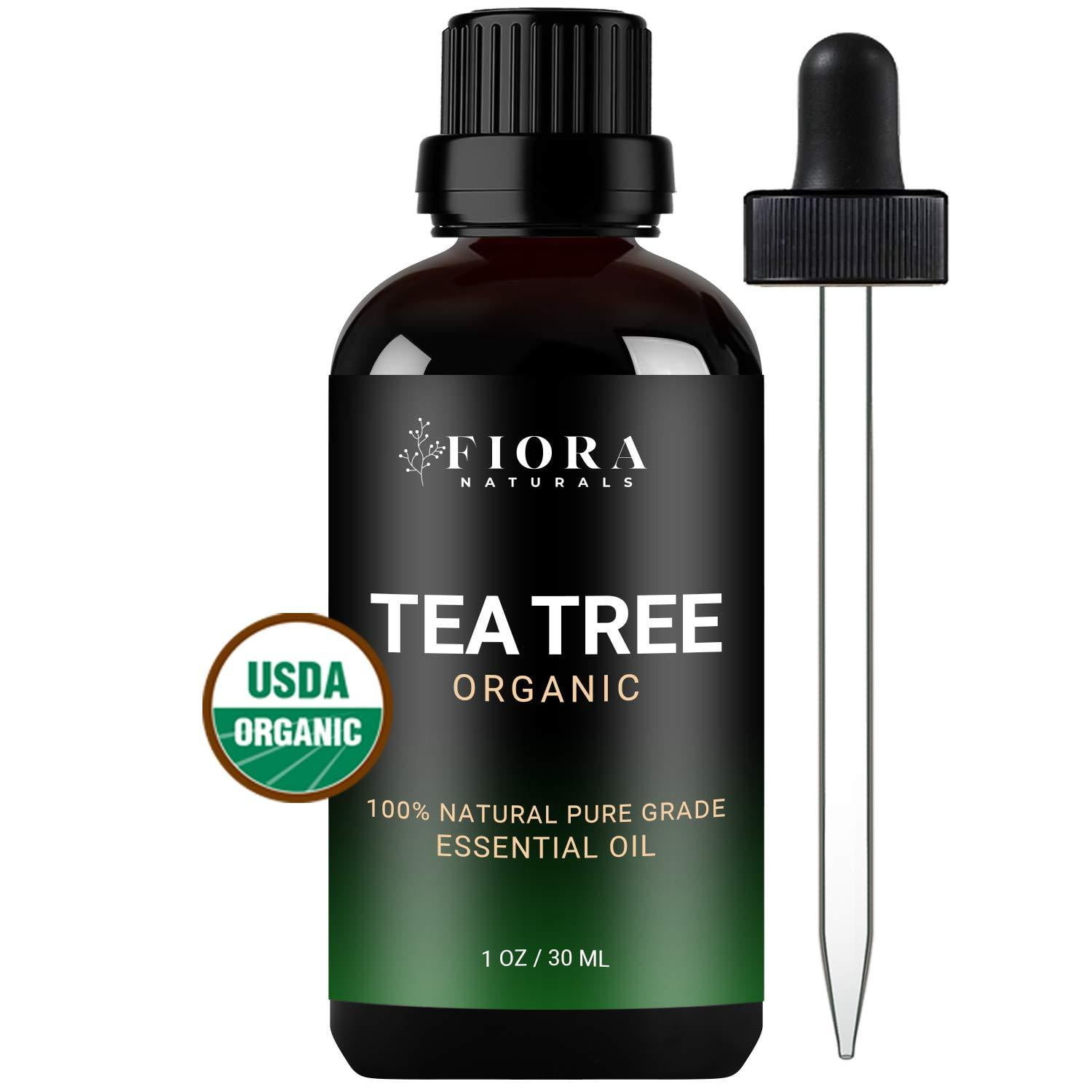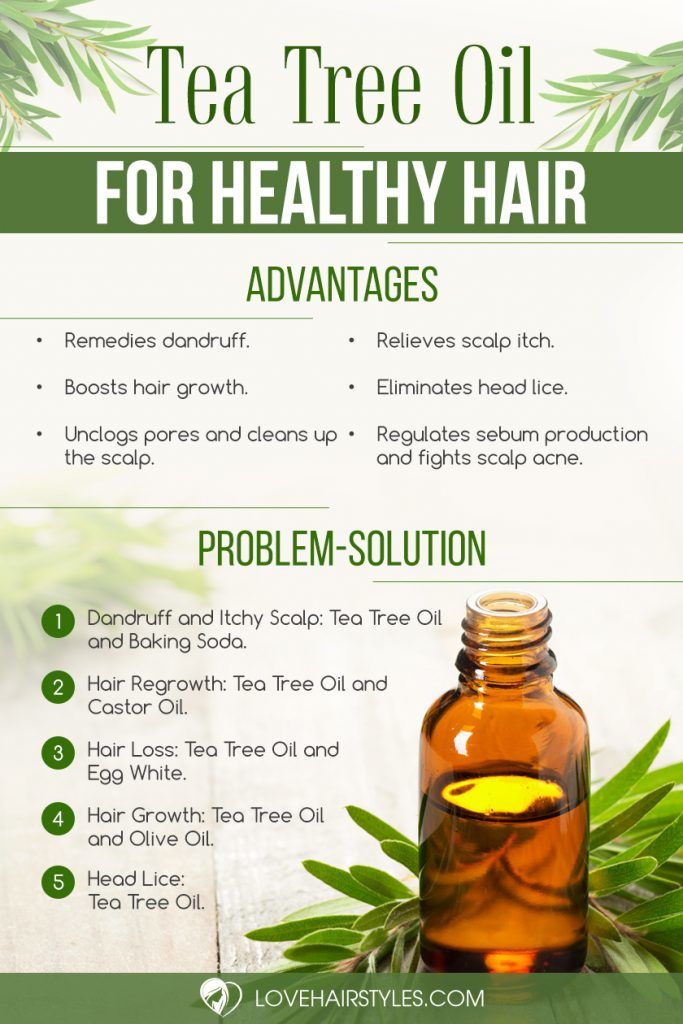Table Of Content

It has also been suggested that tea tree may be an effective remedy against head lice. Tea tree oil can rectify the build-up of these oils by treating the causes at their source, resulting in better-looking locks that won't become overly greasy or unpleasant to deal with. Well, perhaps unsurprisingly, tea tree oil is great for that, too. While it may not be as popular as stress-busting classics like lavender its rich depth in the world of holistic healthcare has earned it the nickname of "medicine cabinet in a bottle" for several decades.
How to Use Tea Tree Oil for Healthy, Thick Hair
Clogged pores block further oil extraction and disturb the natural balance of your scalp which slows down natural hair growth. Tea tree oil balances oil production and protects your scalp from harmful intrusions. Thus it improves scalp condition and keeps the pores clean which helps to prevent hair loss. Tea tree oil can usually be applied to the skin without causing irritation. That being said, you can still have an allergic reaction to tea tree oil, which would cause redness and irritation. Always test a small patch of skin before applying it liberally to the scalp.
Prevents buildup.
It’s widely used in complementary and alternative medicines, and can be found in a range of medicinal topicals and skin care products. This essential oil has powerful anti-inflammatory and antibacterial properties, making it ideal to help heal a number of skin disorders and conditions. How to use tea tree oil is important not only for best results but to avoid irritating your skin. Just shampoo your hair as usual, then add some drops of tea tree oil to the conditioner. Let the tea tree oil and conditioner mix work its magic for a few minutes, then rinse thoroughly.
Scalp Health
A few drops of tea tree oil can be added to wound dressing each time a new dressing is applied. Your underarm area contains a large concentration of these glands and is mainly responsible for what is commonly referred to as body odor. Tea tree oil’s bacteria-fighting properties make it an ideal natural alternative to commercial deodorants and antiperspirants. Tea tree oil has been used as a traditional medicine by the Aboriginal people of Australia for centuries. These native Australians crush tea tree leaves to extract the oil, then inhale it to treat coughs and colds or apply it directly to the skin for healing.
In a previous article discussing the benefits of scalp massages for hair growth, we mentioned that scalp massages are effective at increasing the thickness of your hair. Currently, there are no studies that can identify a direct link between tea tree oil and speeding up your hair growth cycle. However, keep reading because we’ve identified a cool trick that can improve hair growth. Tea tree oil has anti-inflammatory properties that help reduce irritation and inflammation caused by psoriasis. While we don’t have any studies directly pointing to Malassezia, we do have research that directly links tea tree oil to a reduction of dandruff over time. If you choose to make your own tea tree oil mixture, we like to use a concentration of 5%, meaning 5 milliliters (ml) of tea tree oil for 100 ml of the carrier oil.
Best for irritated scalps:Kitsch Castor Oil Nourishing Shampoo Bar
Dandruff is caused by an accumulation of scaly, dry skin on your scalp. If left untreated, the dead skin buildup could ultimately hinder hair growth. A shampoo containing tea tree oil can provide both antifungal and antibacterial benefits. This means it will get rid of what’s causing the dead skin on your scalp.
What Are the Benefits of Tea Tree Oil?
Do this regularly, maybe once or twice per week, depending on the needs of your hair. You can also add a few drops of tea tree oil to your conditioner to relieve the itchiness that arises as a result of a dry scalp. To do this, combine several drops of tea tree oil with a larger quantity of carrier oil, such as jojoba oil. Ultimately because of the anti-fungal and antibacterial properties of the oil, it is an effective method of treating scalp conditions such as dandruff.
Tea Tree Oil For Hair: Benefits, Risks, And How To Use It - Women's Health
Tea Tree Oil For Hair: Benefits, Risks, And How To Use It.
Posted: Thu, 22 Jun 2023 07:00:00 GMT [source]
The Expert Guide to Tea Tree Oil For Hair
Dr. Rodney advises using no more than 5 to 10 drops of tea tree oil in your concoction, as “too much of the product can build up on the skin and worsen any scaling and flaking,” she says. We often recommend using jojoba oil as it's thinner and tends not to clog pores. And Reslan warns against leaving essential oils on the hair or scalp for too long as it can "harden and coat the hair's cuticles," she says. She suggests applying the EO to the hair or scalp for a few minutes, massaging it in if you please, and then shampooing and rinsing after. "This way, you absorb the benefits but rinse out any residue-building excess." Experts aren’t sure what why some people have dandruff and others don’t.
To make a simple leave-in conditioner, combine 1 tablespoon of conditioner or carrier oil with 12 to 15 drops of tea tree EO in a 2 oz spray bottle and fill with warm water. Tea tree oil is less likely than other EOs to cause skin irritation. Still, some people may experience an allergic reaction when using tea tree oil, so it’s best to do a spot test first to see how your skin will react. Derived from the leaves of the Melaleuca alternifolia plant, this oil can help with skin infections, acne, athlete’s foot, and other inflammatory ailments.
As with any skincare or hair care product; there is the risk of having contact dermatitis, which is allergic skin irritation. If you obtain contact dermatitis from a hair product, you may have an itchy scalp. Individuals with sensitive skin may be more prone to contact dermatitis. A recent 2021 review[2] investigated the efficacy of using essential oils to treat androgenetic alopecia, which is the medical term for male and female pattern baldness.
11 Best Tea Tree Shampoos of 2024, Tested and Reviewed - ELLE
11 Best Tea Tree Shampoos of 2024, Tested and Reviewed.
Posted: Tue, 05 Dec 2023 08:00:00 GMT [source]
Tea tree oil washing steps vary slightly based on the hair or scalp problem being treated. When using shampoo or conditioner containing tea tree oil, follow product directions. Some of the alleged benefits of hemp seed oil for hair may be due to its positive effects on the skin, including the scalp. The use of hemp seed oil for hair care is not new, but its popularity has increased in recent years. Keep reading to learn more about hemp seed oil and how it may benefit the hair. Here at Nikura we are passionate about bringing you the highest quality essential oils, fragrance oils and blends to revolutionise your daily routine.

All of our options are formulated for a range of hair textures and types to best suit your personal needs. It is also crucial to always dilute your tea tree oil with a carrier oil and to keep an eye on how your skin reacts to it, no matter how many times you may have used it in the past. Essential oils are naturally potent products, and failure to appropriately dilute them could result in rashes and irritation that would not do your hair any favours. In fact, it is because of the oil's powerful attributes against dandruff that it has become a key ingredient in many anti-dandruff shampoos.
If you’re pregnant or breastfeeding, talk to your doctor before trying tea tree oil on your hair. Although tea tree oil provides benefits, there are a few precautions to consider. With all the severe chemicals found in hair products today, you could be stripping your hair follicle of much-needed nutrients. If you use a lot of products or dye your hair often, you can put your hair at risk of breaking off or falling out. Conditioners protect the hair by mimicking its natural outer layer.
When using tea tree oil to treat the hair and scalp, it's important to make sure you are using an essential oil—not just a fragrance oil, as fragrance oils do not contain the same health benefits. Essential oils are obtained through hydrodistillation, steam distillation, dry distillation, or the mechanical cold pressing of plants. These differ from fragrance oils, which are often manufactured in a lab. Tea tree oil has antifungal and antimicrobial properties that fight this yeast. In an older study, people who used a 5% tea tree oil shampoo daily for four weeks had a 41% reduction in their mild to moderate dandruff. When tea tree oil is applied to the hair and scalp, it can help strengthen hair and remove scalp residue.
It’s also known to help clean the hair, keep it strong, and reduce dandruff. Several studies suggest that hemp seed oil shows promise as a treatment for atopic dermatitis and acne, indicating that it has anti-inflammatory properties. People seeking hair care alternatives containing hemp seed oil can choose from several different products. Discover natural ways to enhance your immune system using essential oils with proven health benefits. Explore the truth about phthalates in essential oils and how to choose safe, quality products.
Massage your scalp gently for 2–3 minutes to help stimulate blood flow to the hair follicles. If desired, add honey or aloe vera gel to the mixture and stir well. Be sure to massage your scalp gently as you rinse to help stimulate blood flow to the hair follicles. Apply a small amount of the hair oil to your scalp and hair, focusing on the roots and ends. Close the bottle tightly and shake well to mix the ingredients well. Pregnant and breastfeeding woman should use tea tree oil with caution.
No comments:
Post a Comment